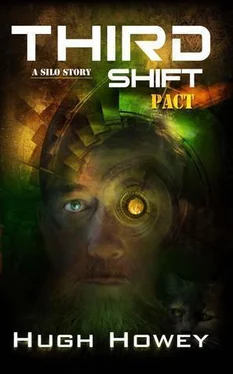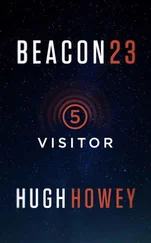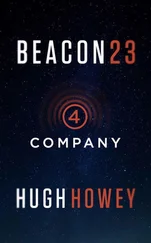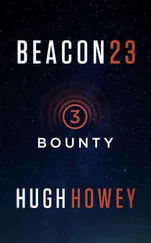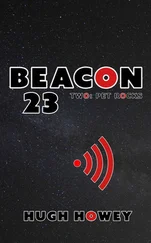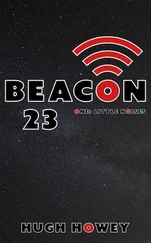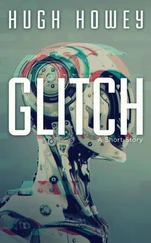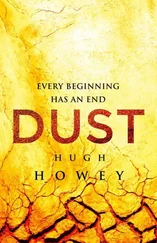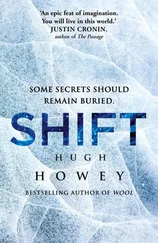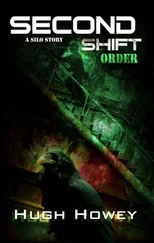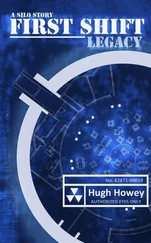Hugh Howey - Third Shift - Pact
Здесь есть возможность читать онлайн «Hugh Howey - Third Shift - Pact» весь текст электронной книги совершенно бесплатно (целиком полную версию без сокращений). В некоторых случаях можно слушать аудио, скачать через торрент в формате fb2 и присутствует краткое содержание. Год выпуска: 2013, Жанр: sf_postapocalyptic, ya, на английском языке. Описание произведения, (предисловие) а так же отзывы посетителей доступны на портале библиотеки ЛибКат.
- Название:Third Shift - Pact
- Автор:
- Жанр:
- Год:2013
- ISBN:нет данных
- Рейтинг книги:3 / 5. Голосов: 1
-
Избранное:Добавить в избранное
- Отзывы:
-
Ваша оценка:
- 60
- 1
- 2
- 3
- 4
- 5
Third Shift - Pact: краткое содержание, описание и аннотация
Предлагаем к чтению аннотацию, описание, краткое содержание или предисловие (зависит от того, что написал сам автор книги «Third Shift - Pact»). Если вы не нашли необходимую информацию о книге — напишите в комментариях, мы постараемся отыскать её.
. All three Shift books will be collected in an Omnibus edition to save the reader a buck or two.
Reading order:
1. WOOL (5 parts)
2. SHIFT (3 parts)
3. DUST (1 part)
Third Shift - Pact — читать онлайн бесплатно полную книгу (весь текст) целиком
Ниже представлен текст книги, разбитый по страницам. Система сохранения места последней прочитанной страницы, позволяет с удобством читать онлайн бесплатно книгу «Third Shift - Pact», без необходимости каждый раз заново искать на чём Вы остановились. Поставьте закладку, и сможете в любой момент перейти на страницу, на которой закончили чтение.
Интервал:
Закладка:
The silo is empty. The silo is empty. It’s full of death from pit to rim. My name was Jimmy, my name was Jimmy. But nobody calls me any longer. I am alone, the ghosts are watching, and solitude makes me stronger.
The last part was a lie, but it was poetry, so it didn’t count. Jimmy stepped away from the board and studied the words with a flickering flashlight. The words were like a voice. His voice. They trailed off to the side and dipped down, each line sagging more than the last, the letters getting smaller toward the end of each sentence. It was a problem he always had with the blackboard. He started big and seemed to shrink as he went. Scratching the stubble on his chin, he wondered what this said of him, what it portended.
There was a lot wrong with what he’d written, he thought. The fifth line was untrue, the one about nobody calling him Jimmy. Above the poem, he had called himself this. I am Jimmy , he had written. He still thought of himself as Jimmy.
He grabbed the stiff rag he’d left in the chalk tray, stood before his poem, and went to erase the line that wasn’t right. But something stopped him. It was the fear of making the poem worse by attempting to fix it. The fear of taking a line away and having nothing good to put in its place. This was his voice, and it was too rare a thing to quash.
Jimmy felt Mrs. Pearson’s eyes upon him. He felt the eyes of his classmates. The ghosts were watching, the corpses laughing, while he studied the problem on the board.
When the solution came, it brought a familiar thrill of arriving at the right place, of connecting the dots. Jimmy reached up and slapped the dusty rag against the board and erased the first thing he’d written. The words I am Jimmy disappeared into a white smear and a tumbling haze of powder. He set the rag aside and began to write a truth in its place.
I am Solitude, he started to write. He liked the sound of that. It was poetic and full of meaning. But like all great poetry, the words had a mind of their own, his deep thoughts intervened, and so he wrote something different. He shortened it to two little neat circles, a swerve, and a slash. Grabbing his bag, he left the room and his old friends behind. All that remained was a poem and the call to be remembered, a mark to prove he’d been there.
I am Solo .
And a haze of chalk fell through the air like the ghost of unwritten words.
Silo 1
•27•
Donald steered the empty wheelchair back to Dr. Wilson’s office. A damp blanket was draped over the armrests and dragged across the tile. He felt numb. His dream that morning had been to give life, not take it. The permanence of what he’d done began to set in, and Donald found it difficult to swallow, to breathe. He stopped in the hallway and took stock of what he’d become. Unknowing architect. Prisoner. Puppet. Hangman. He wore a different man’s clothes. The transformation horrified him. Tears welled up in his eyes, and he wiped them away angrily. All it took was thinking of Helen and Mick, of the life taken from him, to renew the justification. Everything leading up to that point in time, to him awakening in that silo, had been someone else’s doing. He could feel parted strings dangling from his elbows and knees. He was a loose puppet steering an empty wheelchair back to where it belonged.
Donald parked the chair and set the brakes. He took the plastic vial out of his pocket and considered stealing another dose or two. Sleep would be hard to come by, he feared.
The vial went back into the cabinet full of empties. Donald turned to go when he saw the note left in the middle of the gurney.
You forgot this.
— WilsonThe note was stuck to a slender folder. Donald remembered handing it to Dr. Wilson along with the reactor tech’s belongings. The trip to the other two lockers had been a blur. All he could remember was clutching his cell phone, facts coming together, realizing that Anna had played Mick and Thurman to engineer a last-minute switch that made no sense, that could only happen with a daughter bending her father’s ear, and thus his life had been stolen away.
The folder had been in the locker Anna had mentioned to her father in the message. It seemed inconsequential, now. Donald balled up the note from Dr. Wilson and tossed it in the recycling bin. He grabbed the folder with the intention of staggering back to his cot and searching for sleep. But he found himself opening it up, instead.
There was a single sheet of paper inside. An old sheet of paper. It had yellowed, and the edges were rough where bits had flaked off over the years. Small pieces were still in the folder, caught in its spine. Below the single-spaced typing there were five signatures, a mix of florid and subdued penmanship. At the top of the document, boldly typed, it read: RE: THE PACT.
Donald glanced up at the door. He turned and went to the small desk with the computer, placed the folder by the keyboard, and sat down. Anna’s note to her father had the same words in the subject line, along with Urgent. He had read the note a dozen times to try and divine its meaning. And the number in the note had led him to this folder.
He was familiar enough with the Pact of the silos, the governing document that kept each facility’s inhabitants in line, that managed their populations with lotteries, that dictated their punishments from fines to cleanings. But this was too brief to be that Pact. It looked like a memo from his days on Capitol Hill.
Donald read:
All—
It has been previously discussed that ten facilities would suffice for our purposes, and that a time frame of one century would perform an adequate cleanse. With members of this pact both familiar with budget under-runs and how battle plans prove fruitless upon first firing, it should surprise no one that facts have changed our forecast. We are now calling for thirty facilities and a two century time frame. The tech team assures me their progress makes the latter feasible. These figures may be revisited once again.
There was also discussion in the last meeting of allowing two facilities to reach E-Day for redundancy (or the possibility of holding one facility back in reserve). That has been deemed inadvisable. Having all baskets in one egg is better than the danger of allowing two or more eggs to hatch. As it is a source of growing contention, this amendment to the original Pact shall be hereby undersigned by all founding persons and considered law. I will take it upon myself to work E-shift and pull the lever. Longterm survivability prospects are at 42% in the latest models. Marvelous progress, everyone.
V—Donald scanned the signatures a second time. There was Thurman’s simple scrawl, recognizable from countless memos and bills on the Hill. Another signature that might be Erskine’s. One that looked like Charles Rhodes. Illegible others. There was no date on the memo.
He read over it again. Understanding dawned slowly, full of doubts at first, but solidifying. There was a list he remembered from his previous shift, a ranking of silos. Number 18 had been near the top. It was why Victor had fought so hard to save the facility. This decision he mentions in the memo, pulling the lever. Had he said something about this in his note to Thurman? In his admission before he killed himself? Victor had grown unsure of whether or not he could make some decision.
Baskets in one egg. That wasn’t how the saying went. Donald leaned back in the chair, and one of the lightbulbs in Dr. Wilson’s desk lamp flickered. Bulbs were not meant to last so long. They went dark, but there were redundancies.
One egg. Because what would they do to each other if more than one were allowed to hatch?
Читать дальшеИнтервал:
Закладка:
Похожие книги на «Third Shift - Pact»
Представляем Вашему вниманию похожие книги на «Third Shift - Pact» списком для выбора. Мы отобрали схожую по названию и смыслу литературу в надежде предоставить читателям больше вариантов отыскать новые, интересные, ещё непрочитанные произведения.
Обсуждение, отзывы о книге «Third Shift - Pact» и просто собственные мнения читателей. Оставьте ваши комментарии, напишите, что Вы думаете о произведении, его смысле или главных героях. Укажите что конкретно понравилось, а что нет, и почему Вы так считаете.
